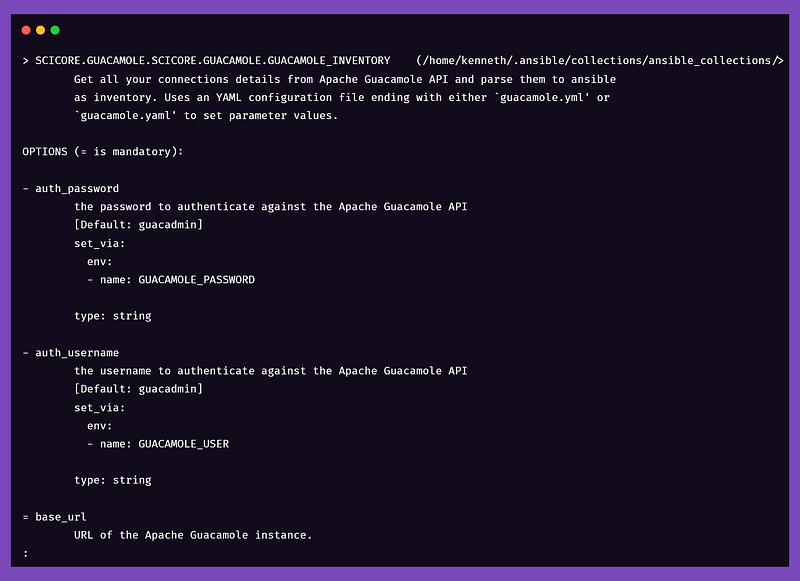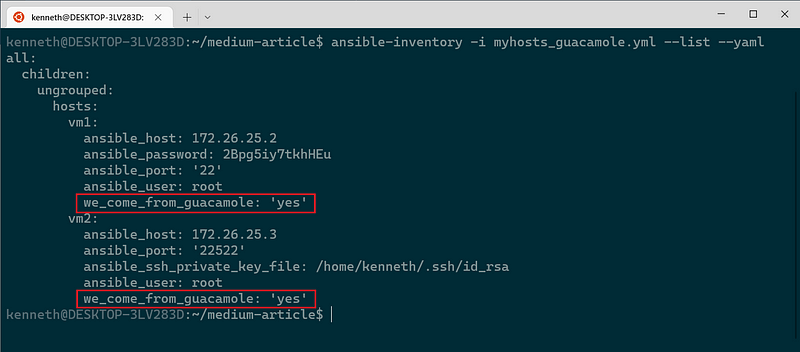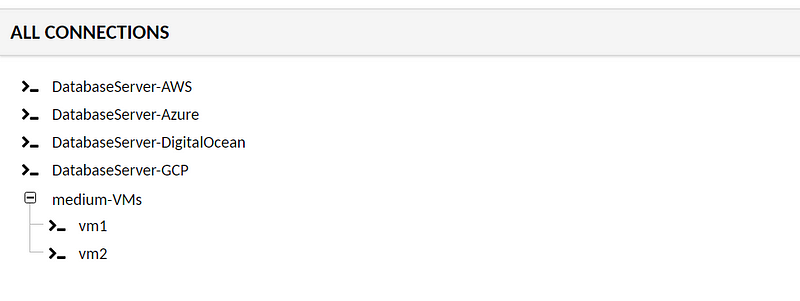Ansible dynamic inventory for Apache Guacamole
Ansible and Guacamole, a match made in heaven.
If you already use Ansible and Apache Guacamole on a daily basis, what would you say about combining them? Using Guacamole as a source for your Ansible inventory? I mean, fetching your hosts’ connection details from Guacamole and passing them to Ansible as inventory.
Wow, really ? That would be insane ! How do you do that ? Can you please show me ?
Sure buddy, that’s the whole point of this article. But first, let me explain (give a small context) to people in the back, what’s going on.

Context
Inventory is one of the fundamental pieces of Ansible. It’s a list of machines you want to run your Ansible playbooks against. An inventory can be static or dynamic. While used by most Ansible users, static inventory isn’t entirely practical in certain situations. For example, when you use Guacamole to connect to the hosts in your infrastructure, you may have already encountered the following issues:
- Manually keeping your hosts connection details stored in Guacamole synced with your static inventory file is tedious. Admit it; you have better things to do than edit YAML files, right?
- Having your hosts (servers) passwords stored in plain text isn’t secure.
- Your host inventory is extensive.
Ansible dynamic inventory has been introduced in order to solve these problems. Ansible can pull inventory information directly from dynamic sources like Azure, docker, AWS, Guacamole, etc. To achieve this, a dynamic inventory plugin specific to each source is used. This article is an outline of how to use the guacamole_inventory plugin.
Now that the stage is set, let’s eat !!
Requirements
To complete this tutorial, you will need the following things:
- Ansible installed on your laptop/server
- A running Apache Guacamole instance
Installation
To tie your Ansible inventory to Guacamole, you have to install the guacamole_inventory plugin through one of the installation methods below.
Installation from Collection
The guacamole_inventory plugin is part of the scicore.guacamole collection on Ansible galaxy. That collection contains all the stuffs needed to communicate with your Guacamole instance via Ansible. It’s also the easiest way to obtain the plugin. Just open your terminal and run:
ansible-galaxy collection install scicore.guacamole
To check if the plugin has been successfully installed, execute:
ansible-doc -t inventory scicore.guacamole.guacamole_inventory
You should have an output similar to this :

Installation as a standalone plugin (out of collection)
Download the guacamole_inventory.py file from this repository, to the DEFAULT_INVENTORY_PLUGIN_PATH path on your machine.
What is
DEFAULT_INVENTORY_PLUGIN_PATH?
It’s a colon separated paths list in which Ansible will search for Inventory Plugins by default.
Execute ansible-config dump | grep DEFAULT_INVENTORY_PLUGIN_PATH to view your current configuration settings for Inventory Plugins. After the plugin file is added to one of these locations, Ansible loads it and you can use it in any local module, task, playbook, or role.
The execution of the above command on my machine, give me this:

My Ansible installation is then expecting to have inventory plugins in one of these locations:
/home/kenneth/.ansible/plugins/inventory/usr/share/ansible/plugins/inventory
I decided to install it to the /home/kenneth/.ansible/plugins/inventory directory.
Since it’s my first plugin installation, this location doesn’t exist. I will create it manually and download the plugin there:
mkdir -p ~/.ansible/plugins/inventory
cd ~/.ansible/plugins/inventory/
wget https://raw.githubusercontent.com/theko2fi/ansible-guacamole-dynamic-inventory/main/guacamole_inventory.py
To check if the plugin has been successfully installed, execute:
ansible-doc -t inventory guacamole_inventory
You should have an output similar to this :

Usage
Since I’m the author of this plugin (yes I’m bragging about it haha), I’m going to paste parts of the documentation here. Below, you have a list of all the options supported by the plugin with their default values, a small description, and the type of data expected.
plugin:
description: Token that ensures this is a source file for the 'guacamole_inventory' plugin.
type: string
required: true
choices: [ guacamole_inventory ]
base_url:
description:
- URL of the Apache Guacamole instance.
- It is recommended to use HTTPS so that the username/password are not
transferred over the network unencrypted.
required: true
type: string
auth_username:
description: the username to authenticate against the Apache Guacamole API
type: string
default: guacadmin
env:
- name: GUACAMOLE_USER
auth_password:
description: the password to authenticate against the Apache Guacamole API
type: string
default: guacadmin
env:
- name: GUACAMOLE_PASSWORD
selected_connection_groups:
description:
- A list of connection group names to search for connections.
- 'ROOT' will include all connections from Guacamole instance.
type: list
elements: str
default: ["ROOT"]
validate_certs:
description:
- Validate ssl certs?
default: true
type: bool
The mandatory options are:
- plugin: the value should always be either
scicore.guacamole.guacuacamole_inventoryorguacamole_inventory, depending on the installation method you have chosen. - base_url: the URL of your guacamole instance API
- auth_username: your admin username to authenticate to the API
- auth_password: your admin password to authenticate to the API
I will cover later in this article, the usage of the other options with some examples. But first, let’s see the most basic usage of this plugin.
Create a folder for all the examples in this article:
mkdir medium-article
cd medium-artcile
Now let’s create our dynamic inventory file, which will use the plugin. The name of the file SHOULD end with either guacamole.yml or guacamole.yml. This is required for the plugin to detect and read the inventory file. I’ll call mine, myhosts_guacamole.yml.
touch myhosts_guacamole.yml
Paste the content below into the myhosts_guacamole.yml file.
plugin: guacamole_inventory
base_url: http://localhost:8080/guacamole
auth_username: guacadmin
auth_password: guacadmin
Note: If you have chosen the collection installation method, you should use
scicore.guacamole.guacamole_inventoryas the plugin value like this :
plugin: scicore.guacamole.guacamole_inventory
base_url: http://localhost:8080/guacamole
auth_username: guacadmin
auth_password: guacadmin
Now, let’s test it:
ansible-inventory -i myhosts_guacamole.yml --list
This should return a JSON output of all your SSH connections details stored in your Apache Guacamole instance. Something like this:

From Guacamole web UI, you can see that I have two hosts: vm1 et vm2.

If you would rather get a well formatted YAML output in Ansible way, try this:
ansible-inventory -i myhosts_guacamole.yml --list --yaml
And that would return a similar output:

You could also keep the output minimal as a graph containing just the groups and hosts with:
ansible-inventory -i myhosts_guacamole.yml --graph

Both VMs belong to the ungrouped group, which is a child of the allgroup in the Ansible inventory.
This means the plugin is working. Ansible is now able to target your hosts based on the connection details stored in Guacamole.
You can also test the connectivity to these hosts with the ping module:
ansible all -i myhosts_guacamole.yml -m ansible.builtin.ping
That’s the quickest way to get started with this plugin. Now let’s dive into all the good ways to customize our inventory with a few examples.
Note: For the hosts using ssh private key as authentication method, the
ansible_ssh_private_key_filevariable points by default to~/.ssh/id_rsafile. We will see in the next section, how we could override this.
Examples
Now let’s explore the other available options of this plugin with some examples.
1. Compose
Add variables to each host found by this inventory plugin, whose values are the result of the associated expression.
Scenario: Let’s say we want to add a particular variable and value to all the hosts listed by this plugin. We should use the compose option. Update the content of the myhosts_guacamole.yml file like this:
plugin: guacamole_inventory
base_url: http://localhost:8080/guacamole
auth_username: guacadmin
auth_password: guacadmin
compose:
we_come_from_guacamole: "'yes'"
We execute again:
ansible-inventory -i myhosts_guacamole.yml --list --yaml
Result:

This option could also be used to override some existing variables used by Ansible to connect to the hosts. For example, if I would rather use a different ssh key file than the default one, the inventory file will look like this:
plugin: guacamole_inventory
base_url: http://localhost:8080/guacamole
auth_username: guacadmin
auth_password: guacadmin
compose:
ansible_ssh_private_key_file: "/path/to/my/guacamole_key"
All the hosts with private-key defined and listed by this plugin, will use the guacamole_key.
2. Groups
Places a host in the named group if the associated condition evaluates to true.
Scenario: Let’s assume we have the following connections in Guacamole.

And we want to group together in our inventory, all the connections using the name pattern DatabaseServer-*.
plugin: guacamole_inventory
base_url: http://localhost:8080/guacamole
auth_username: guacadmin
auth_password: guacadmin
groups:
Guacamole_Databases: "'DatabaseServer' in name"
Result:

All the connections containing the name DatabaseServer, are placed inside the group Guacamole_Databases.
3. Keyed_groups
Places hosts in dynamically-created groups based on a variable value.
Scenario: We want to group together, hosts listening on the same ssh port number.
Sample of myhosts_guacamole.yml file:
plugin: guacamole_inventory
base_url: http://localhost:8080/guacamole
auth_username: guacadmin
auth_password: guacadmin
keyed_groups:
- prefix: group-based-on-ssh-port
key: ansible_port
Result:

4. Selected_connection_groups
Fetches connections from an explicit list of connection groups instead of default all (- ‘ROOT’)
Scenario: We have the connections groups shown below in Guacamole. And we want to target the hosts in VMware-Servers group only.

The content of the myhosts_guacamole.yml file could look like this:
plugin: guacamole_inventory
base_url: http://localhost:8080/guacamole
auth_username: guacadmin
auth_password: guacadmin
selected_connection_groups:
- VMware-Servers
Result:

Conclusion
While primarily used as remote desktop gateway to connect to computers/servers from anywhere, Guacamole can also serve as ‘vault’ to keep servers login credentials. In this article, we have seen how it can be used an inventory source for Ansible, in order to get the best out of each tool. Thanks for reading to the end. Feedbacks are welcome, here in the comments section or on the project GitHub repository: